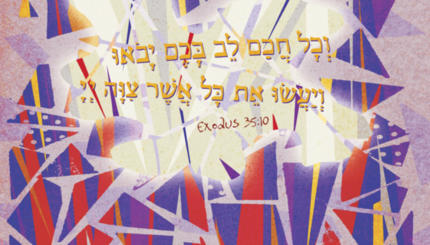Reading the
has always fascinated me. I grew up in a home of leyners (readers of Torah, traditionally men) and I loved nothing more than the “gossip” surrounding synagogue on Shabbat. Who had an
aliyah
? Why was there a hosafa (an extra aliyah, usually to accommodate a celebration or yahrtzeit)? Why did we read a special
maftir
?
When my three brothers came close to their
bar mitzvah
age, they learned how to read from the Torah. I was so fascinated that I had them teach me the trop (cantillation), but they soon tired of it, as did I. I didn’t see much point as I wasn’t able to do anything with the trop anyway.
Over the years, nothing really changed. I still loved listening to the Torah leyning; I still followed along closely with all the readings and different tunes. But the knowledge itself remained in a secret garden, one that I only saw bits of as I peeked over the hedge.
Then – one day – someone opened a door to this secret garden. Judy Rosen organized a course for women in ta’amei hamikra (cantillation marks). I heard about it and thought: “Me? Learn now? Hey – I’m over forty!” And on the heels of that came another thought: “If Rabbi Akiva could learn to read Hebrew at age forty – well – I can do this too.” I didn’t know what I would do with that knowledge but I felt it touch a chord deep inside.
Signing up for that course was one of the best decisions that I ever made.
From the very first lesson, I was totally hooked. I’d stay up at night until the wee hours practicing each new set of ta’amim (tunes) that Judy taught us. In fact, I had to force myself to finish everything else that I needed to do first or I simply wouldn’t get to them. Practicing my leyning was my reward after all else was done.
At around this time, a women’s prayer group started in Ra’anana. After a few months, Judy pronounced us “ready” to read an aliyah. I was petrified. Me, ready? What if I made a mistake? What if I froze? But I couldn’t resist the siren’s call. I practiced that aliyah over and over. There was one particularly complex pasuk (verse) that I just couldn’t get right and worried over it aloud to my husband. He laughed and said: “Those are the psukim that leyners dream about.” That was all I needed to hear – I wanted to be one of those leyners too! And I learned that it’s okay to make a mistake, God knows we aren’t perfect.
Reading from a Sefer Torah (Torah scroll) for the first time was an incredible experience for me. I was full of awe, apprehension and excitement. Standing so close to our holiest object, I felt honored and moved. This was truly a rite of passage for me. Everyone disappeared except me, the Sefer Torah and God.
I was thrilled to have learned to leyn and walk around that garden freely. What I didn’t know was that just beyond were many more gardens that unfolded and unlocked before me– teaching leyning, giving divrei Torah, leading davening and acting as
gaba’it
in a partnership minyan. Each one was a step on a path I had not taken before. Each step required taking a deep breath and placing my foot forward, at first hesitantly, then more firmly. Each time I embraced a new skill it gifted me with new insight and deepened my connection to God.
I once heard a sculptor describe his work. He said that in every rock or slab of marble lies a sculpture. His job was to free it.
This is what has happened to me. Each garden that I enter uncovers a truer and more honest me. Over ten years have passed since that first Torah leyning class and today I am a full-time student at Yeshivat Maharat.
When you find something that fills you with passion and makes you happy – grab it. It may change your life in the most unexpected ways.
Reading is a great way to enter the secret garden of leyning. Check out JOFA’s Megillat Esther app!
Like this post? Join the conversation through MyJewishLearning’s weekly blogs newsletter.



